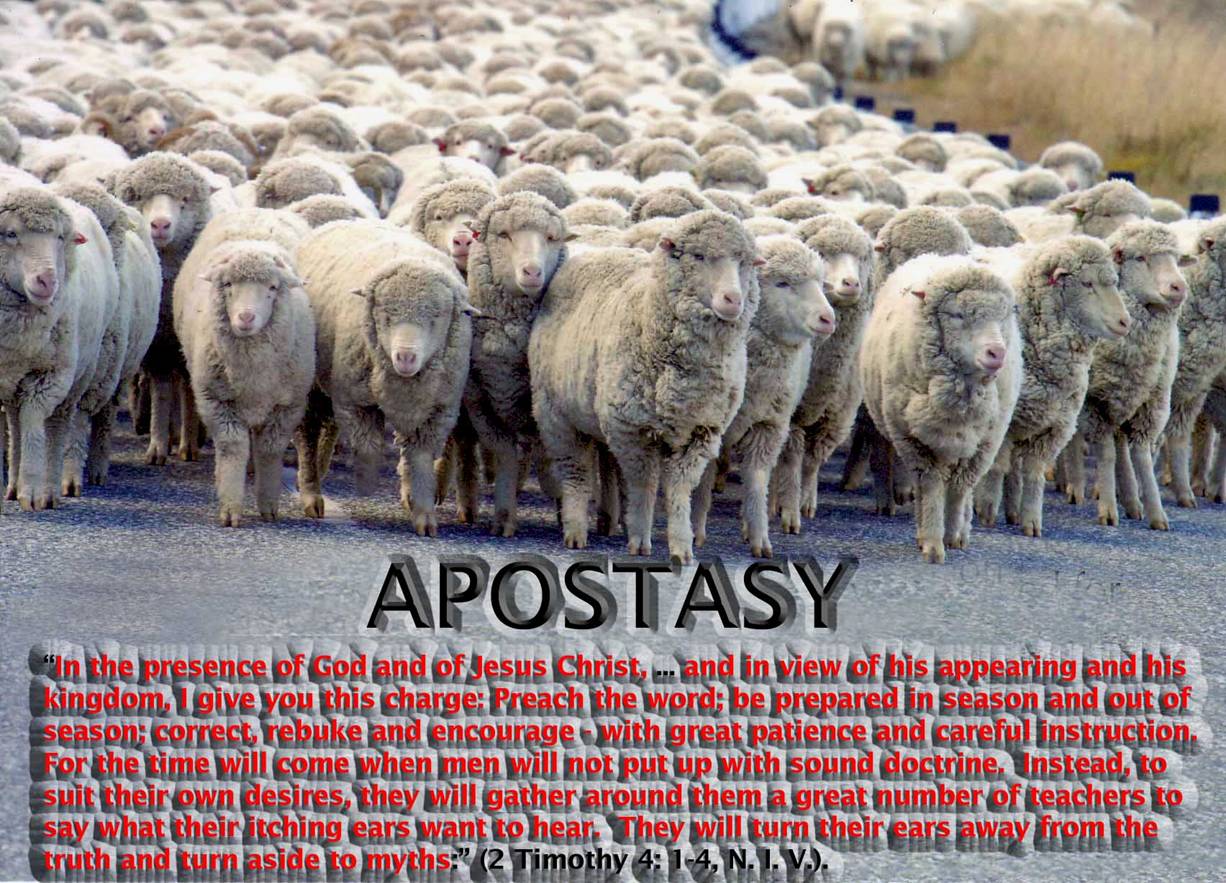
A REPENTANT APOSTATE
IN THE GREAT TRIBULATION
A moment comes when Gods people cross the irrevocable
line. Under Manasseh, who outstripped
all the Kings of Israel in wickedness, apostasy in
Scripture names are most studiedly significant, and Manassehs
at once blazes out:- Manasseh means forgetting,
one who forgets (Gesenius): it is the apostate;
one who has forgotten the Faith - either having never been born again, or else
a regenerate soul who has turned his back on His Saviour. Manassehs early convictions are (doubtless
purposely) not revealed, and so he covers both.
There had arisen in Judah - the last refuge on earth of Divine
revelation - a violent hostility to Jehovah, His worship, and His Prophets, a
significant forecast of our coming apostasy; and Manasseh, brought up in a most
godly home, embodies exactly what we are watching - a younger generation
deepeningly alienated from God. The
receptivity of youth, which can take the impress of the highest, can equally -
like twelve-year-old Manasseh in the hands of a godless palace clique - take
the stamp of the worst. Following the
great revival under Hezekiah, as we have behind us the great Christian outburst
of the nineteenth century, for fifty years the King, backed (as a whole) by the
people of God, plunged into an apostasy without parallel in history.
The fountain of both the past and future apostasies is
identical. Paul foretells:- Some shall depart [apostatize] from the faith, giving heed to SEDUCING SPIRITS (1 Tim. 4: 1), and therefore in active communication with them. Manasseh, more than any Israelite in the Old
Testament, is the incarnation of Spiritualism.
He
practised augury, and used enchantments, and practised sorcery - literally, muttered; that is, he spoke in tongues* - and dealt with them that had familiar spirits - an exact description of the
mediumship of all ages, every medium owning a spirit so, frequent at his beck
and call as to be familiar and with wizards (2 Chron. 33: 6).
The Askera, the inconceivable wickedness of
the phallic symbol, he set up in the
* So Isaiah
(8: 19) speaks of them
that have familiar spirits and the wizards, that chirp and that mutter . All that know
the modern manifestations, inside or outside the
The fearful character of the apostate now develops. Manasseh made
God, ever and always, gives full warning, and the rejection of
the warnings only deepens the iniquity.
And the
Lord spake to Manasseh, and to his people: but
they gave no heed (2 Chron. 33: 10).
Like modern Dictators, Manasseh broke into bitter bloodshed when
opposed. Manasseh shed innocent blood very much, till
he had filled
Now judgment, which falls on the people of God in all ages as
certainly as on the world, descends. Jehovah
says that He will stretch over
A fact of extraordinary significance now emerges. Golden revivals, that are still due, cannot
cancel the great
tribulation for apostasy:
when a certain line is passed, judgment is inevitable. Manasseh, and the people of God behind Manasseh,
had sinned beyond collective pardon. Of
the next king but one, Josiah, the
inspired summary is marvellous:- Like unto him was there no
king before him, neither after him arose there any like him. Yet what is immediately added? Notwithstanding the Lord turned not from the
fierceness of his great wrath, wherewith his anger was kindled against
So now we reach the extraordinary grace of God. In a priceless forecast of what we may expect,
we find that apostates, whether
regenerate or not, who have passed into the Great Tribulation, can be amazingly
brought back to God. There came the
shock of battle - the fearful overthrow - the headlong flight - the capture - the
chains - the dungeon. The King of Assyria took
Manasseh in chains, and bound him with fetters, and carried him to
So then we have in Manasseh as crowning a proof of Gods grace
as we have in all history. This is the
only case of a Jewish king reigning wickedly and finally repenting; the longest
reign in all Jewish history, the longest and the blackest, ends in a golden
sunset. But it is much more than that. The man who turns his back on Christ and
enters the Great Tribulation, but who, in those dread terrors, returns passionately
to his Lord, is almost certain to be martyred - but that is the Throne. All martyrs are enthroned (Rev. 20: 4) at the Lords return.
And God
brought him again to
* One proof that the Angel is a
regenerate man is final. If ye are without chastening, then are ye bastards,
and not sons (Heb. 12: 8). But to the Laodicean the Lord says: As many
as I love I reprove and chasten be
zealous therefore, and repent (Rev. 3: 19).
The Angel is chastened therefore he is a
son. He scourgeth
every
son whom he receiveth
(Heb. 12: 6).
-------